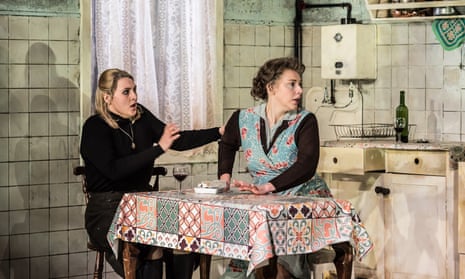Gian Carlo Menotti’s life (1911-2007) reads like a cocktail of his own operas. First composition: aged five. First opera: aged 11. First seance: in his school holidays. Retaining a sense of the mystical, he compared composition to water divining: wait for the stick to start trembling, then dig. Menotti made a fortune thanks chiefly to his TV opera for children, Amahl and the Night Visitors (1951), commissioned by the US network NBC, and ended his days as laird of a glorious Scottish Palladian mansion in East Lothian. Why Scotland? Because of the wind, the rain, the cold, which he loved, and so he could be “completely cut off from my past. It was a desire to find a place where I could hide.”
That alien sense of identity came in part from being an Italian in America, an American in Italy, and gay when to be so was illegal. That statelessness is central to The Consul, Menotti’s first full-length opera, about a political dissident in an unnamed totalitarian country, oppressed by bureaucracy. The work has been given a rare staging by Guildhall School of Music and Drama’s excellent opera department, conducted by Timothy Redmond and directed by Stephen Medcalf, last performance tomorrow. The relevance of its subject matter hardly needs stating.
Menotti wrote The Consul, libretto too, in the late 1940s at the start of the cold war. It was first performed, to great acclaim, in 1950 on Broadway. He’d have liked Maria Callas. She wasn’t available. That gap between composition and premiere is significant. Creating tuneful, well-honed music in a post-Puccini vein, Menotti has never fitted any category except his own. This has led to exaggerated sneering, particularly from green-eyed avant gardists whose music may be more interesting but has not bought them stately homes.
Little account has been taken of the ways in which Menotti was skilful, fertile and, for someone written off as conservative, often ahead of the game. The consul of the title is a Godot-like figure (ahead of Beckett’s 1953 play, which still only existed in his notebook) who never appears. The opera’s opening scene is domestic: a young wife, Magda, husband John, their baby and his mother share a brittle conversation in the kitchen where, yes, there is a sink. Call it kitchen sink drama if you like, but at least give Menotti credit for being several years ahead of that term’s common use.

There’s also a touch of Brecht, a bizarre dream, a comic interlude with a magician (expertly sung and prestidigitated, in the second of two casts, by Daniel Mullaney) and a waltz sequence. At the start the music is anaemic, yet it grows more interesting as the score unfolds, with eerie, menacing woodwind effects and a prominent, earthy piano. Yes it’s filmic, but that’s not yet a crime. Guildhall orchestra’s playing was secure, agile in response to the many mood changes. The music is effective rather than memorable. It works hard and supports the action; in that sense, more of a musical than an opera. It’s not Bach, but nor is it Offenbach, as Menotti said himself.
Guildhall’s impressive, dozen-strong vocal ensemble, each having their spotlight moment, displayed plenty of talent, every word of the English text audible. All acted well, and danced smartly to Victoria Newlyn’s witty movement direction. Simon Corder’s compact staging had a nice 50s drabness. In Wednesday’s performance, Michael Vickers mustered febrile, pent-up anger as the shadowy dissident, John Sorel. Chloe Latchmore as the Mother was tense and tender. Emily Kyte cleverly mixed spikiness and elan as the super-bureaucratic Secretary. The huge main role of Magda, who is rarely offstage, was sung with heartfelt conviction by Lucy Anderson. Watch out for her. Everyone deserved a cheer.
This is very nearly a tale of two Scottish-obsessed and prolific Italian opera composers, united by East Lothian. Donizetti’s 1835 bel canto tragedy, Lucia di Lammermoor, is set in the same Lammermuir hills which, with a bit of a stretch, Menotti might have seen from his parapet. Katie Mitchell’s avowedly feminist production, new at the Royal Opera in 2016, is back for its first revival. Much has been simplified, to good effect.

Vicki Mortimer’s beautifully detailed split set allows a more complex presentation of the story than usual, foreground action in one half, background response in the other. It remains distracting, silent action sometimes upstaging singing, but there’s less gore, less running water and greater clarity in the depiction of Lucia as an independent woman. The brass initially sounded somewhat lackadaisical under the baton of Michele Mariotti, but otherwise chorus and orchestra were ablaze.
The cast is outstanding: Christopher Maltman (Enrico), Charles Castronovo (Edgardo) and Michele Pertusi (Bidebent), with Lisette Oropesa crystalline and ethereal in the title role. At the conductor’s request there is no glass harmonica for the mad scene – a loss – but the replacement flute solo is exquisite. Perversely or not, Donizetti’s opera reshapes its source, Walter Scott’s The Bride of Lammermoor, so that the men are now to blame for Lucia’s forced marriage and thwarted love. In the original, the heroine’s mother was the villain, scheming against her own daughter. This realisation makes for an even more complicated gender equation than Katie Mitchell’s, which I’m not quite up for yet.
Star ratings (out of 5)
The Consul ★★★★
Lucia di Lammermoor ★★★★
The Consul is at Silk Street theatre, London, until 6 November

Comments (…)
Sign in or create your Guardian account to join the discussion